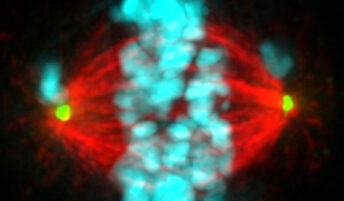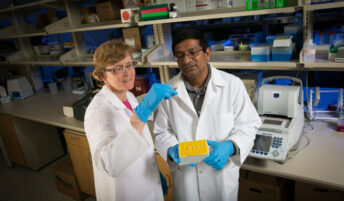
New Initiative for Theranostics and Particle Therapy launched
A key focus of the initiative will be translational research, or research that is designed to benefit human health. Investigators will assess how particle beam radiation may be effective to treat cancers that are difficult to treat using conventional radiation therapy, how diagnostic and treatment steps can be combined into a single step referred to as theranostics, and how radiation treatment plans can be personalized for each patient.

New study supports recommendation to begin mammogram screening at 40
Breast cancer screening every two years beginning at age 40 has the potential to reduce the number of women who die of breast cancer while minimizing the harms, according to a large study published today.

UW clinical trial tests new way to treat glioblastoma
A new clinical trial at UW Health | Carbone Cancer Center uses a personalized medicine method to try to teach the immune system to recognize and destroy glioblastoma tumors.

UW Carbone Cancer Center receives SPORE designation, federal grant to support prostate cancer research
University of Wisconsin Carbone Cancer Center will be designated as a Specialized Program of Research Excellence, or SPORE, by the National Cancer Institute (NCI) for research initiatives to advance new prostate cancer treatments.

UW study details how HPV may promote head and neck cancer
Cancer researchers have long known that the sexually transmitted human papillomavirus (HPV) is a leading cause of head and neck cancer and now a study from the University of Wisconsin School of Medicine and Public Health sheds light on how HPV turns healthy cells into cancer.

UW researchers looking for new ways to screen for ovarian cancer, earlier detection
A project began today at the UW–Madison Prevention Research Center that is focused on earlier detection of ovarian cancer.

Black patients in Wisconsin 50% less likely to be treated for pancreatic cancer
Black patients with pancreatic cancer have lower survival rates than white patients, and a new study suggests why: They are much less likely to receive life-extending treatments.

The future of cell therapy: Novel study tests treatment for radiation-induced dry mouth
For certain side effects of complex and lifesaving medical procedures, care teams can be left with limited and risky treatment options, but a program at UW Health is changing that using patients’ own cells as “living therapeutics.”

Future of health: Cancer vaccines
When people consider vaccines, many think about the pandemic and about preventing illness. However, certain UW researchers have a very different focus when they work with vaccines.

UW–Madison expert launches novel cancer research using sharks
There are some new residents on the University of Wisconsin–Madison campus, but they aren’t students, they’re sharks.

Cancer Center Cessation Initiative launches new effort to help cancer patients quit smoking
It’s well documented that smoking can lead to cancer. But in recent years, evidence has been mounting that continuing to smoke during cancer treatment can be just as harmful, or even worse.

Access to Medicare increases lung cancer screening rates
If lung cancer is caught early enough, it’s treatable with a high chance of long survival. But many people at high risk because of their smoking history aren’t screened until they turn 65 and are eligible for Medicare coverage.